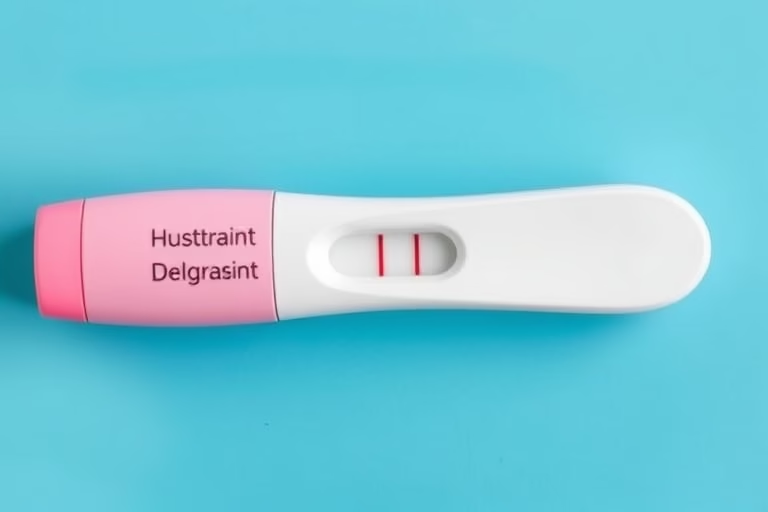Understanding Implantation Bleeding
Implantation bleeding occurs when a fertilized egg attaches itself to the lining of the uterus. This process usually takes place around 6 to 12 days after conception, which can often lead to confusion as some women may mistake it for their menstrual period. Recognizing the signs of implantation bleeding is crucial, as it can be an early indicator of pregnancy. This type of bleeding is typically light pink or brown and lasts only a few hours to a couple of days.
Many expectant mothers often wonder about the timing of taking a pregnancy test after noticing this type of bleeding. Understanding the relationship between implantation bleeding and when to take a pregnancy test is essential for obtaining accurate results and managing expectations. A pregnancy test measures the levels of human chorionic gonadotropin (hCG) in the urine, which starts to be produced shortly after implantation.
What is hCG?
Human chorionic gonadotropin, more commonly known as hCG, is a hormone that plays a vital role in pregnancy. It is secreted by the cells that form the placenta after implantation occurs. Within days following implantation, hCG levels begin to rise rapidly, and this hormone is what many home pregnancy tests look for. The higher the levels of hCG in the urine, the more likely a pregnancy test will yield a positive result.
The levels of hCG can vary from woman to woman and can be affected by how early a pregnancy test is taken. This is why understanding the timing of testing after implantation bleeding is crucial. Taking a test too early may result in a false negative if the hCG levels are not yet high enough to detect. For optimal accuracy, it is recommended to wait at least a few days after the implantation bleeding occurs.
Timing the Pregnancy Test
Knowing when to take a pregnancy test after noticing implantation bleeding can affect the accuracy of the results. Typically, it is ideal to wait at least one week after the bleeding. This allows the body enough time to produce sufficient hCG levels for a test to detect a pregnancy accurately. Each woman’s body reacts differently, so some may find they can test a little earlier than this, while others may need to wait longer.
Additionally, testing first thing in the morning can increase the chances of getting an accurate reading. This is because urine is typically more concentrated in the morning, leading to higher levels of hCG and a more reliable test result.
Identifying Implantation Bleeding
To determine if the bleeding you are experiencing is indeed implantation bleeding, consider the following signs:
If you are observing these signs, it is likely that you could be experiencing implantation bleeding, which may lead to pregnancy. However, for confirmation, a pregnancy test is needed.
Common Symptoms of Pregnancy
Aside from implantation bleeding, there are several common symptoms that could indicate pregnancy:
Each woman’s experience is unique, and not all will experience every symptom. However, if you notice several of these symptoms occurring soon after implantation bleeding, it might be time to take a pregnancy test.
The Psychology of Early Testing
The anticipation of a potential pregnancy can lead women to feel anxious and eager to take a pregnancy test. While this is entirely normal, it is essential to approach testing with a clear understanding. Taking a test too soon can lead to disappointment and confusion if the result is negative. It is crucial to be patient and wait for the appropriate time after implantation bleeding to ensure accurate results.
Understand that waiting a little longer can make a difference, both in emotional satisfaction and in the accuracy of the test. The psychological effect of waiting can also add to the built-up excitement and hopefulness of potential pregnancy.
Home Testing vs. Blood Testing
When it comes to testing for pregnancy, women generally have two options: home pregnancy tests or blood tests performed at a doctor’s office. Home pregnancy tests are accessible, easy to use, and provide quick results. However, they vary in sensitivity, and understanding their effectiveness is important.
Blood tests are conducted by a healthcare provider and can detect pregnancy earlier than most home tests because they can measure lower levels of hCG. If you’re uncertain about your home test results, or if you want a more definitive answer, consulting with a healthcare professional might be beneficial.
False Negatives: Understanding the Results
A common concern with pregnancy testing is the possibility of false negatives. This could occur if the test is taken too early, not allowing time for hCG levels to rise sufficiently. Other reasons for false negatives include not following the test instructions properly or using a test that is past its expiration date.
If you suspect you are pregnant and receive a negative result, it is advisable to wait a few days and test again. If periods are missed and symptoms continue, consulting a healthcare provider is recommended to conduct further evaluations.
Final Thoughts
Understanding when to take a pregnancy test after experiencing implantation bleeding is an important aspect of confirming a potential pregnancy. Since implantation bleeding usually occurs 6 to 12 days after conception, waiting about a week after this phenomenon can yield better results. Being aware of when your last menstrual period was and recognizing the signs of pregnancy can further clarify the situation.
Additionally, different factors such as when you test and the type of test used can affect results. Home pregnancy tests provide a convenient way to check for pregnancy, but knowing their limitations is vital. If uncertainty arises, consulting with a healthcare professional for blood testing is a reliable method.
Remember, if you suspect pregnancy, monitoring the symptoms associated with it can also provide additional clarity. Take the time necessary to ensure accurate results, as you deserve to have the correct information regarding your health.
Frequently Asked Questions
Further Reading
What Type of Psychotherapy Is Best for Anxiety?







